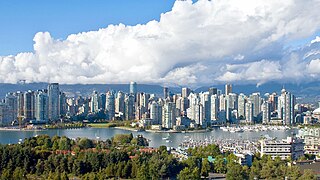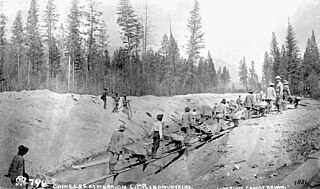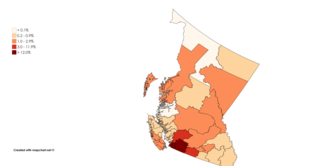
British Columbia is the westernmost province of Canada. Situated between the Pacific Ocean and the Rocky Mountains, the province has a diverse geography, with rugged landscapes that include rocky coastlines, sandy beaches, forests, lakes, mountains, inland deserts and grassy plains. British Columbia borders the province of Alberta to the east; the territories of Yukon and Northwest Territories to the north; the U.S. states of Washington, Idaho and Montana to the south, and Alaska to the northwest. With an estimated population of over 5.5 million as of 2023, it is Canada's third-most populous province. The capital of British Columbia is Victoria, while the province's largest city is Vancouver. Vancouver and its suburbs together make up the third-largest metropolitan area in Canada, with the 2021 census recording 2.6 million people in Metro Vancouver.

Vancouver is a major city in western Canada, located in the Lower Mainland region of British Columbia. As the most populous city in the province, the 2021 Canadian census recorded 662,248 people in the city, up from 631,486 in 2016. The Metro Vancouver area had a population of 2.6 million in 2021, making it the third-largest metropolitan area in Canada. Greater Vancouver, along with the Fraser Valley, comprises the Lower Mainland with a regional population of over 3 million. Vancouver has the highest population density in Canada, with over 5,700 people per square kilometre, and fourth highest in North America.

There has been a significant history of Chinese immigration to Canada, with the first settlement of Chinese people in Canada being in the 1780s. The major periods of Chinese immigration would take place from 1858 to 1923 and 1947 to the present day, reflecting changes in the Canadian government's immigration policy.

The history of British Columbia covers the period from the arrival of Paleo-Indians thousands of years ago to the present day. Prior to European colonization, the lands encompassing present-day British Columbia were inhabited for millennia by a number of First Nations.

From 1942 to 1949, Canada forcibly relocated and incarcerated over 22,000 Japanese Canadians—comprising over 90% of the total Japanese Canadian population—from British Columbia in the name of "national security". The majority were Canadian citizens by birth and were targeted based on their ancestry. This decision followed the events of the Japanese Empire's war in the Pacific against the Western Allies, such as the invasion of Hong Kong, the attack on Pearl Harbor in Hawaii, and the Fall of Singapore which led to the Canadian declaration of war on Japan during World War II. Similar to the actions taken against Japanese Americans in neighbouring United States, this forced relocation subjected many Japanese Canadians to government-enforced curfews and interrogations, job and property losses, and forced repatriation to Japan.

Franco-Columbians are French Canadians or Canadian francophones living in the province of British Columbia. According to the 2016 Canadian Census, 71,705 residents of the province stated that French is their mother tongue. In the same census, 388,815 British Columbians claimed full or partial French ancestry.
Charles "Red" Lillard was an American-born poet and historian who spent much of his adult life in British Columbia and became a Canadian citizen in 1967. He wrote extensively about the history and culture of British Columbia, Southeast Alaska and the Pacific Northwest.

The Vancouver Police Department (VPD) is the police force in Vancouver, British Columbia, Canada. It is one of several police departments within the Metro Vancouver Area and is the second largest police force in the province after RCMP "E" Division.

The history of Vancouver, British Columbia, is one that extends back thousands of years, with its first inhabitants arriving in the area following the Last Glacial Period. With its location on the western coast of Canada near the mouth of the Fraser River and on the waterways of the Strait of Georgia, Howe Sound, Burrard Inlet, and their tributaries, Vancouver has – for thousands of years – been a place of meeting, trade, and settlement.

Fanny Bay is an unincorporated community in the Canadian province of British Columbia. It is located on Baynes Sound on the east coast of Vancouver Island. It has a population of 921. It is best known for its fine oysters. The area is served by the Island Highway.

Deep Bay is an unincorporated area on the east coast of Vancouver Island, in British Columbia, Canada across Baynes Sound from Denman Island which has a government marina in a naturally protected harbour. It is situated on Highway 19A north of Qualicum Beach between Fanny Bay and Bowser.
The Italian Cultural Centre is located at 3075 Slocan Street, in East Vancouver, Canada, on Slocan Street at Grandview Highway. The centre is noted to host a bar, multiple classrooms and various groups. Anna Foschi Ciampolini, as the coordinator, organized the conference at the centre that founded the Association of Italian-Canadian Writers. At its gate is a welded sculpture called Pagan by Italian sculptor Severino Trinca.
The Vancouver riots occurred September 7–9, 1907, in Vancouver, British Columbia, Canada. At about the same time there were similar anti-Asian riots in Bellingham, Washington, San Francisco, and other West Coast cities. They were not coordinated but instead reflected common underlying anti-immigration attitudes. Agitation for direct action was led by labour unions and small business. No one was killed but the damage to Asian-owned property was extensive.
The history of Chinese Canadians in British Columbia began with the first recorded visit by Chinese people to North America in 1788. Some 30–40 men were employed as shipwrights at Nootka Sound in what is now British Columbia, to build the first European-type vessel in the Pacific Northwest, named the North West America. Large-scale immigration of Chinese began seventy years later with the advent of the Fraser Canyon Gold Rush of 1858. During the gold rush, settlements of Chinese grew in Victoria and New Westminster and the "capital of the Cariboo" Barkerville and numerous other towns, as well as throughout the colony's interior, where many communities were dominantly Chinese. In the 1880s, Chinese labour was contracted to build the Canadian Pacific Railway. Following this, many Chinese began to move eastward, establishing Chinatowns in several of the larger Canadian cities.

The South Asian community in British Columbia was first established in 1897. The first immigrants originated from Punjab, British India, a northern region and state in modern-day India and Pakistan. Punjabis originally settled in rural British Columbia at the turn of the twentieth century, working in the forestry and agricultural industries.
Alan Twigg, CM has received the Order of Canada, as a prolific journalist, historian, biographer, website-builder, film maker, community-builder and athlete. He created Canada's most-read, independent publication about books, BC Bookworld, a trade newspaper for the British Columbia book publishing industry and served as its publisher and main writer for thirty-three years until he gave the business away in 2020. He also founded or co-founded many of the province's major literary awards. When he was accorded an honorary doctorate by Simon Fraser University in 2022, SFU described him as British Columbia's leading man of letters. He also developed ABCBookWorld, an online encyclopedia of British Columbia authors. He is also a recipient of the Lieutenant Governor's Award for Literary Excellence in 2016.

The history of Japanese people in British Columbia began with the arrival of Manzo Nagano in New Westminster in 1877. Prior to 1942, British Columbia was home to 90% of all Japanese in Canada. In 2001, 44% of all Japanese Canadians lived in British Columbia, or about 1% of the province's total population.
An Internment Camp in Vernon, BC was established to hold enemy aliens and POWs during the First World War. Once Canada entered World War I, fears of enemy aliens on the home front began to arise. To combat this, the Canadian Government implemented The War Measures Act which gave them the authority to intern and disenfranchise enemy aliens living in Canada. Approximately 8,500 enemy aliens were interned across Canada, with majority of the 24 camps located around the Rocky Mountains and large population centres in Ontario. Vernon housed the permanent camp in British Columbia, operating from September 18, 1914, to February 20, 1920.
Rolf Knight (1936–2019) was a Canadian historian, author of working class and regional history of British Columbia.











